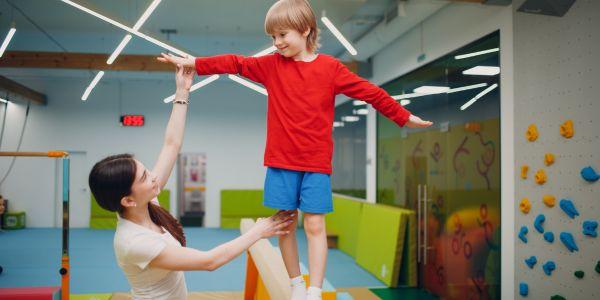Reasons Why Sports Kids Don’t Believe in Themselves
For a number of reasons, many sports kids don’t believe in themselves—and that’s bad news for them, their teams and their coaches.
Here are just a few causes:
- They doubt their abilities
- They’re perfectionists and expect too much
- Their parents pressure them too much
When kids don’t believe in themselves, they hurt their performance and enjoyment of sports.
Kymber Veautour, a Top Warner cheer coach who has garnered two national wins, says this is the main problem that hurts her team members’ mental game. But she has lots of ideas for overcoming this challenge.
“I continuously have to be an advocate for the children on my teams. For some reason they have blocks that lead them to failure. I tell them the only thing that’s stopping themselves is themselves.”
One of the problems, says Veautour, is parents.
They have a hard time striking that fine balance between pushing kids too hard and simply supporting them, she says. It’s a hard balance to achieve, she adds.
“Strong involvement from parents can be detrimental,” she says.
At the same time, parents need to be supportive. They can’t back off entirely.
“You can see the effects on kids. They try so hard to please their parents. It affects everything they do.”
Here at Kids’ Sports Psychology, we agree with Veautour and believe that a number of other factors affect whether kids believe in themselves…
Often, for whatever reason, kids embrace beliefs that cause them to doubt themselves. For example, they give themselves negative labels. “I’m not a good tumbler,” they say. Sometimes, external factors are the influence. One example is coaches who only focus on the negative.
Here’s the good news. Veautour—who after all, has garnered a few national championships—has some strategies for helping these kids.
First of all, she tells kids to take it step by step. If they can conquer one step in cheering, they’re ready for the next. And the next…
We call this focusing on the moment—not on outcomes like wins. Kids need to focus on what they need to do right now to get the job done.
Second, Veautour removes labels. She tells kids they’re all cheerleaders—not bad tumblers or bad jumpers. She reminds them that they’re all good at something.
Third, Veautour works one-on-one with kids who have had bad days. She doesn’t focus on the negatives, but reminds them that tomorrow is another day. “I tell them to go home, take a shower, relax and think about what they did. Take it one step at a time.”
And fourth, we’d like to remind parents that kids need to understand they can’t be perfect every day. It’s okay for sports kids to have a bad day as long as they grow and learn from their mistakes—instead of beating themselves up.
Related Articles on Kids’ Mental Game:
- Helping Young Athletes Who Criticize Themselves
- Don’t Believe Sports Kids Are Bullied Too? Learn About CNN Poll
- How Athletes Can Stop Overthinking
*Subscribe to The Sports Psychology Podcast on iTunes
*Subscribe to The Sports Psychology Podcast on Spotify
The Composed Sports Kid

“The Composed Sports Kid” audio and workbook digital download program for young athletes and their parents or coach helps kids cope with frustration and anger in sports. Help your sports kids learn how to manage expectations and let go of mistakes so they can keep their head in the game.
The Composed Sports Kid system is really two programs in one–one program to train parents and coaches how to help their kids practice composure, and one program that teaches young athletes–ages 6 to 13–how to improve composure, let go of mistakes quickly, have more self-acceptance, and thus enjoy sports more!


This is a great article. The issue seems always to be more about the mental outlook then the physical tools. The hardest thing for parents to understand is that the “helpful” hints tend to put MORE pressure on the athletes and adversely affect their play. The more the coach can somehow separate this influence and also have an open dialogue with the parents on being a POSITIVE force, the better off everyone will be.